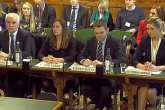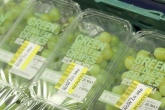Supermarkets close to agreement on common food waste reporting
An agreement has been reached among ‘many leading food retailers and their suppliers’ on a ‘series of principles’ regarding reporting on their food waste by company and using a common methodology.
 IGD, a charity providing research and expertise to the food and grocery industry, today (15 November) told Resource that an agreement had been reached between leading supermarkets on a number of principles, with the next steps for the companies being ‘to apply the principles, refine their measurement method and check for comparability’, while ‘the implications for reporting the information are also being discussed’.
IGD, a charity providing research and expertise to the food and grocery industry, today (15 November) told Resource that an agreement had been reached between leading supermarkets on a number of principles, with the next steps for the companies being ‘to apply the principles, refine their measurement method and check for comparability’, while ‘the implications for reporting the information are also being discussed’.
IGD has been working ‘closely’ with the Waste and Resources Action Programme (WRAP) on the issue, with that work set to continue over the next year.
The statement issued by IGD was in response to an article published in The Grocer last Friday (10 November) in which it was reported that, following talks facilitated by IGD, leading supermarkets had ‘agreed on a standardised system’ and to ‘report on a company-level basis, rather than just the sector figure that has previously been reported’.
The story’s unnamed source added that the key aspect of the agreement still to decide was ‘whether figures will be reported by IGD or whether it is something left to individual companies to report’.
IGD sought to clarify that, as reported in the article, ‘IGD was asked by a series of companies to facilitate discussions on standardising the measurement of food waste in the UK’ at the start of 2017 but that the article was anticipating steps that could be reached in the future and had not yet come to pass.
Following the release of the article, food waste campaign group Feedback, founded by food campaigner Tristram Stuart, announced victory in the fight to get supermarkets to publish their food waste individually, thereby increasing transparency, although this now seems premature in light of IGD’s statement today.
Transparency in food waste
The issue of transparency in food waste has gained prominence over the past year or so. Four of the UK’s leading supermarkets - Tesco, Sainsbury’s, Morrisons and Waitrose - were grilled by Parliament’s Environment, Food and Rural Affairs (EFRA) Committee in January over their actions to reduce food waste, with their methodologies for reporting food waste coming under the microscope.

While Waitrose records average bin weight, Morrisons ‘capture[s] information financially at store level’ and Sainsbury’s measures its waste in tonnage, without going down to category level. Tesco, meanwhile, captures data on a category basis at store level, allowing it, it claims, to be able to calculate ‘each day and each store’s waste’.
Speaking last summer, Mark Little, Head of Food Waste Reduction at Tesco, explained that while the supermarket scans each item that is out of date and calculates the total weight through that in a ‘bottom-up’ approach, others weigh bins at the back of stores, taking in packaging waste and anything else that may be included. This also does not enable organisations to locate any specific products that are contributing a significant proportion to their waste and therefore act on the food waste hot-spots.
Following this hearing, EFRA called for the government to establish a national food waste reduction target, with retailers being forced to publish transparent figures on their generated food waste, in its ‘Food Waste in England’ report in April.
The government recently rejected this suggestion in October, saying that it would not force retailers to publish food waste figures, and reiterated its support for the voluntary Courtauld Commitment 2025, which aims for a 20 per cent reduction in food and drink waste by 2025.
Action afoot
While politicians seem to be divided on the topic, the direction of travel among retailers does seem to lead towards more individual reporting of food waste data by companies.
Tesco has led the way in this respect, becoming the first UK supermarket to reveal its food waste figures back in 2013, while CEO Dave Lewis called for more supermarkets to do the same in June 2016.

Last summer, a framework designed to help businesses and governments measure, report on and manage their food loss and waste in a consistent way was launched by the World Resources Institute. The Food Loss and Waste Accounting and Reporting Standard was developed by a multi-stakeholder partnership, and seeks to harmonise definitions and processes for recording food waste. “Measuring the level of food waste in a structured way is critical for developing effective strategies that focus on reducing food waste and monitoring progress at the business, national and EU level,” said Toine Timmermans, Project Coordinator for the EU-FUSIONS programme.
An 'important first step'
Responding to the reports, Carina Millstone, Executive Director of Feedback, said: “Feedback’s campaigns have for years argued that real action on food waste starts with transparency. So we’re delighted that retailers have decided to come clean on what they waste, and how.
“The fact that one third of food is wasted around the world is a climate calamity as well as a moral disgrace: it is high time the food industry took responsibility for their part in this. Reporting on food going to waste across their operations is an important first step, allowing retailers to develop comprehensive and credible plans to identify waste hotspots and prevent it occurring in the first place.
“The next step will be to extend that transparency across their supply chains – food continues to go to waste on farms because of retailer policies and this too must be addressed to achieve a less wasteful food chain.” 











